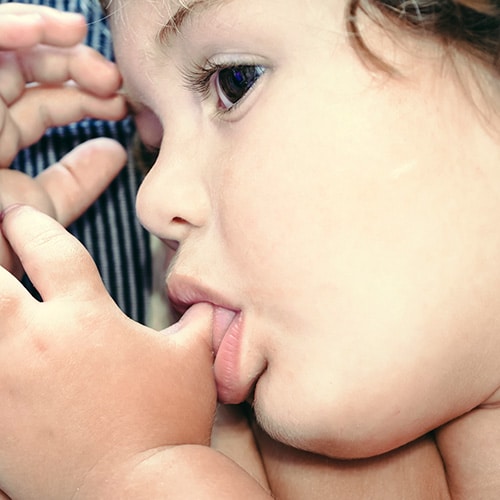Finger and thumb-sucking are very common in infancy and early childhood. In fact, some babies begin sucking their thumbs or fingers even before birth. For most children, this habit is normal and typically fades over time.
However, if thumb-sucking continues for too long or happens frequently with strong pressure, it can begin to affect how your child’s teeth and jaws develop. At San Marcos Kids Dentistry, we help parents understand when a habit is harmless, when it may become a concern, and what gentle steps can support healthy growth.
What Are Finger Habits?
Finger habits include thumb-sucking, finger-sucking, or using fingers for comfort. Many children do this when they are:
- Falling asleep
- Watching TV
- Feeling tired, overwhelmed, or anxious
- Seeking comfort in new environments
This habit is often soothing, and it’s not something children do “on purpose” to cause problems. That’s why a calm and supportive approach works best.
Why Do Children Suck Their Thumbs or Fingers?
Thumb-sucking is usually a self-soothing behavior that helps children feel safe and relaxed. It may be more common during:
- Big life changes (new school, new sibling, moving homes)
- Stressful situations
- Bedtime routines
- Moments of boredom
Understanding why your child is sucking their thumb can help you guide them toward healthier coping habits.
When Does Thumb-Sucking Become a Problem?
The American Dental Association (ADA) recommends that children ideally stop thumb-sucking by age 4 to reduce the risk of dental changes.
Thumb-sucking becomes more concerning when it is:
- Frequent (daily or throughout the day)
- Long-lasting (several years)
- Intense (strong suction or pressure)
- Still present as permanent teeth begin coming in
The earlier the habit ends, the more likely the teeth and jaw will develop normally without long-term effects.
What Dental Problems Can Thumb-Sucking Cause?
Persistent thumb-sucking past age 4 may contribute to orthodontic and dental concerns, including:
- Crooked or misaligned teeth
- Overbite
- Anterior open bite (front teeth don’t touch when biting down)
- Crossbite
- Narrow palate (roof of the mouth becomes more arched)
- Changes in jaw growth and alignment
- Speech concerns (in some cases)
The effects depend on how often, how long, and how forcefully your child sucks their thumb, as well as how the thumb rests inside the mouth.
How Can Parents Help Children Stop Thumb-Sucking?
Breaking a finger habit takes patience, and most children do best with encouragement rather than punishment. Here are supportive strategies that work well for many families:
Encourage Positively
Praise your child for progress and effort. Avoid scolding or embarrassing them, which can increase anxiety and make the habit worse.
Use Gentle Reminders
A simple reminder can help your child become more aware of the habit:
- Band-aid on the thumb
- Sock or glove at bedtime
- Reminder bracelet or sticker
These should feel supportive, not like a punishment.
Create a Reward System
Reward charts can be very effective for children:
- Stickers for thumb-free hours or days
- Small prizes for reaching goals
- Celebrating milestones together
This helps your child feel proud and motivated.
Address Underlying Stress
If your child sucks their thumb due to anxiety or changes in routine, try focusing on what is causing stress and offering comfort in other ways.
Offer Distractions
Thumb-sucking often happens during predictable moments. Try replacing the habit with another activity:
- Holding a small toy
- Coloring
- Fidget tools
- Reading together at bedtime
Explain the “Why” in Kid-Friendly Terms
Children respond well when they understand the reason. You can say something like:
“Thumb-sucking can push your teeth forward, and we want your smile to grow strong and straight.”
Consider Routine Triggers
If a blanket or stuffed animal is part of the thumb-sucking routine, it may help to gradually change the routine so both habits fade together.
When Should You Talk to a Dentist?
If thumb-sucking continues after age 4, or if you notice changes in your child’s teeth or bite, it’s a great time to ask for guidance.
At San Marcos Kids Dentistry, we can monitor tooth development and recommend age-appropriate strategies to help protect your child’s smile.
Frequently Asked Questions
Finger and thumb habits are common in early childhood, and many parents wonder when to simply observe and when to seek guidance. These answers help clarify what to expect and how to support healthy development.
Is Thumb-Sucking Always a Dental Problem?
No. Many children stop on their own without any dental effects, especially when the habit ends early.
Does the Frequency of Thumb-Sucking Matter More Than Age?
Yes. How often, how long, and how forcefully a child sucks their thumb plays a major role in dental impact.
Can Thumb-Sucking Affect Permanent Teeth?
If the habit continues as permanent teeth begin to erupt, it may influence alignment and bite development.
Should I Worry If Thumb-Sucking Only Happens at Night?
Occasional nighttime thumb-sucking is usually less concerning, but consistency over time should be monitored.
Can Finger Habits Affect Speech Development?
In some cases, prolonged habits may influence tongue placement, which can contribute to speech concerns.
